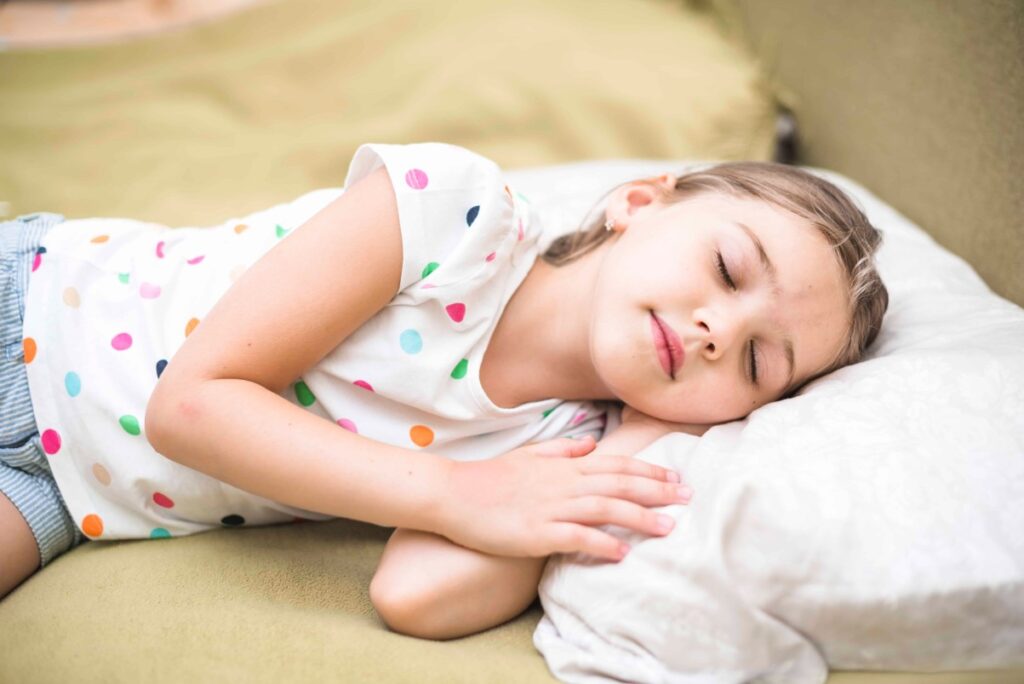American Academy of Sleep Medicine has just released, for the first time, its recommendations for how much sleep children and teens should get to avoid health risks.
Anyone who has ever watched children get on a school bus before the sun is up in the morning or teens walk into their first class clutching a jug of coffee knows that too many young people aren’t getting enough sleep. In fact, experts say that more than a third of the U.S. population doesn’t. Now, the American Academy of Sleep Medicine has just released, for the first time, its recommendations for how much sleep children and teens should get to avoid health risks.
The academy also said that children and teens who do not sleep the recommended amount put themselves at risk for obesity, diabetes, depression, behavior and learning problems, hypertension and more. For teens, there’s more: an increased risk of suicidal thoughts, suicide attempts and self-harm, the panel said.The recommendations are:
- Infants 4 to 12 months should sleep 12 to 16 hours per 24 hours (including naps) on a regular basis to promote optimal health.
- Children 1 to 2 years of age should sleep 11 to 14 hours per 24 hours (including naps) on a regular basis to promote optimal health.
- Children 3 to 5 years of age should sleep 10 to 13 hours per 24 hours (including naps) on a regular basis to promote optimal health.
- Children 6 to 12 years of age should sleep nine to 12 hours per 24 hours on a regular basis to promote optimal health.
- Teenagers 13 to 18 years of age should sleep eight to 10 hours per 24 hours on a regular basis to promote optimal health.
Teens getting up to 10 hours of sleep? Remember that teens, because of unique sleep patterns driven by their circadian rhythms, have a hard time falling asleep before 11 p.m., and their brains stay in sleep mode until at least 8 a.m. With school often starting very early in the morning, teens can’s get eight to 10 hours of sleep. That’s why in 2014, the American Academy of Pediatrics issued a policy statement recommending that middle and high schools start class no earlier than 8:30 a.m. Some school districts have moved their start times, but most haven’t, meaning that most teens who go to school are likely to carry on without the recommended sleep.
The American Academy of Sleep Medicine says it is the only professional society dedicated exclusively to the medical sub-specialty of sleep medicine. Its release of the sleep recommendations came after a 10-month study conducted by a panel of 13 leading sleep experts that reviewed 864 published scientific articles about the relationship between sleep and children’s health and evaluated the evidence. These recommendations are endorsed by the American Academy of Pediatrics, the Sleep Research Society and the American Association of Sleep Technologists.
The new recommendations differ slightly from those released last year by the National Sleep Foundation:
- Newborns (0-3 months): Sleep range narrowed to 14-17 hours each day (previously it was 12-18)
- Infants (4-11 months): Sleep range widened two hours to 12-15 hours (previously it was 14-15)
- Toddlers (1-2 years): Sleep range widened by one hour to 11-14 hours (previously it was 12-14)
- Preschoolers (3-5): Sleep range widened by one hour to 10-13 hours (previously it was 11-13)
- School-age children (6-13): Sleep range widened by one hour to 9-11 hours (previously it was 10-11)
Frequently asked questions (FAQs)
1. How much sleep do infants need?
- Newborns typically need around 14-17 hours of sleep per day, which includes naps. As they grow, this gradually decreases to about 12-15 hours by the age of three months.
2. What is the recommended sleep duration for toddlers and preschoolers?
- Toddlers (1-2 years old) usually require about 11-14 hours of sleep, including naps. Preschoolers (3-5 years old) generally need 10-13 hours of sleep, including naps.
3. Why is adequate sleep crucial for children?
- Sufficient sleep is vital for children as it supports their growth, development, learning, and overall health. It aids in cognitive functions, emotional regulation, and physical well-being.
4. How can I tell if my child is getting enough sleep?
- Signs that indicate your child is getting adequate sleep include being alert, happy, and able to concentrate during the day. Conversely, signs of insufficient sleep may include irritability, difficulty focusing, and excessive daytime sleepiness.
5. What factors can affect a child’s sleep pattern?
- Various factors such as screen time before bedtime, irregular sleep schedules, excessive stimulation, or underlying medical conditions can impact a child’s ability to sleep well.
6. How can I establish healthy sleep habits for my child?
- Creating a consistent bedtime routine, providing a comfortable sleep environment, limiting screen time before bed, and ensuring a healthy diet and regular physical activity can all contribute to healthy sleep habits for children.
7. What should I do if my child has trouble sleeping?
- If your child consistently has trouble sleeping, it’s essential to discuss this with their healthcare provider. They can help identify any underlying issues and provide guidance on improving sleep quality.
8. Is napping important for older children?
- Napping can still be beneficial for older children, especially if they haven’t met their recommended sleep duration for the night. However, excessive or late napping might interfere with bedtime sleep.
9. How does lack of sleep impact children’s behavior and learning?
- Insufficient sleep in children can lead to irritability, difficulty concentrating, mood swings, and behavioral issues. It can also affect their ability to learn, retain information, and perform well academically.
10. Are there specific sleep guidelines for different age groups?
- Sleep guidelines can vary based on age groups, and recommendations may change over time as children grow. Healthcare providers often provide age-specific sleep guidelines to help parents ensure their child gets adequate rest.

